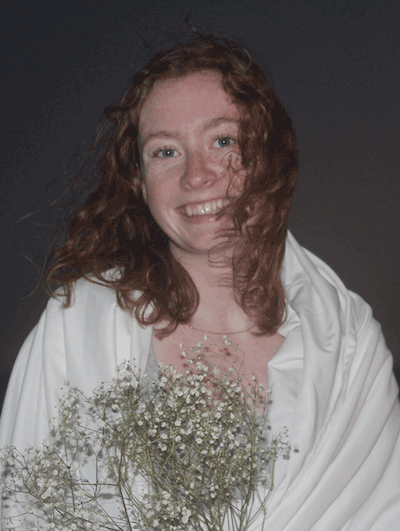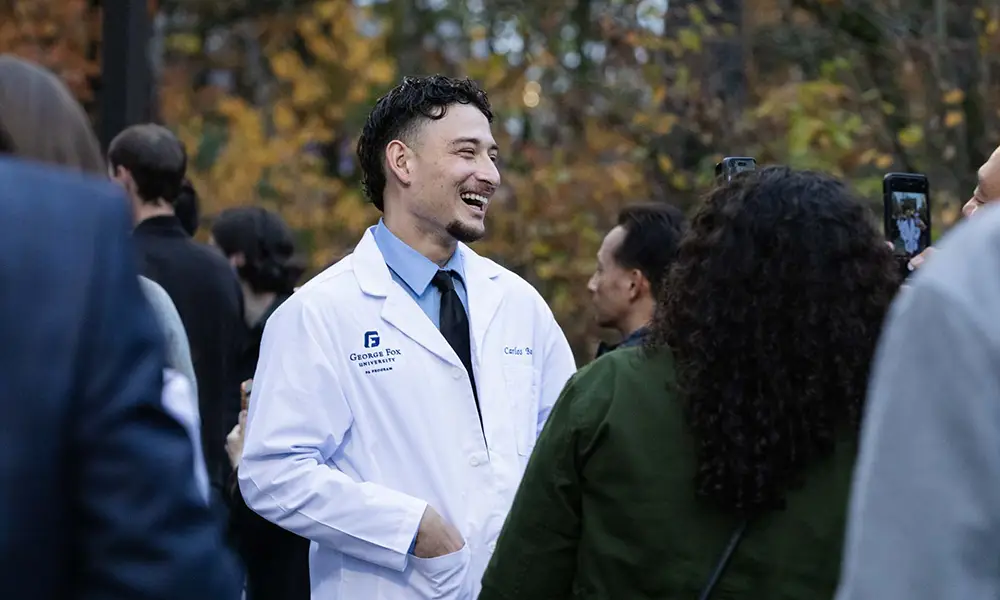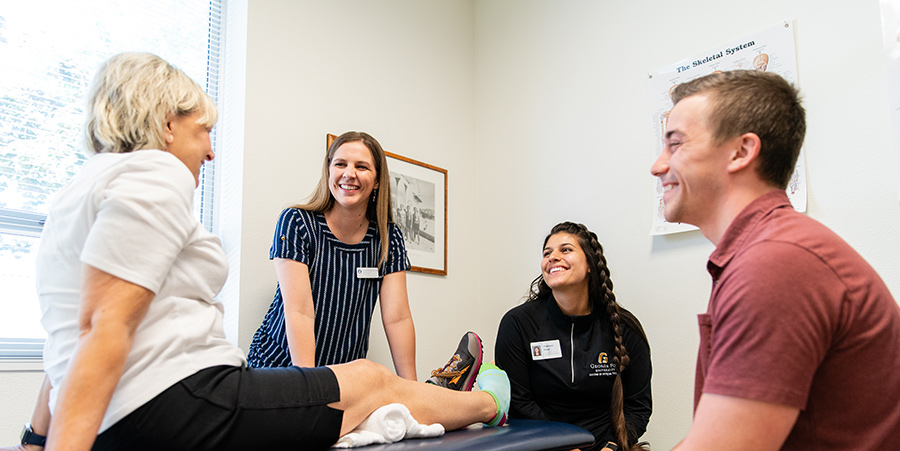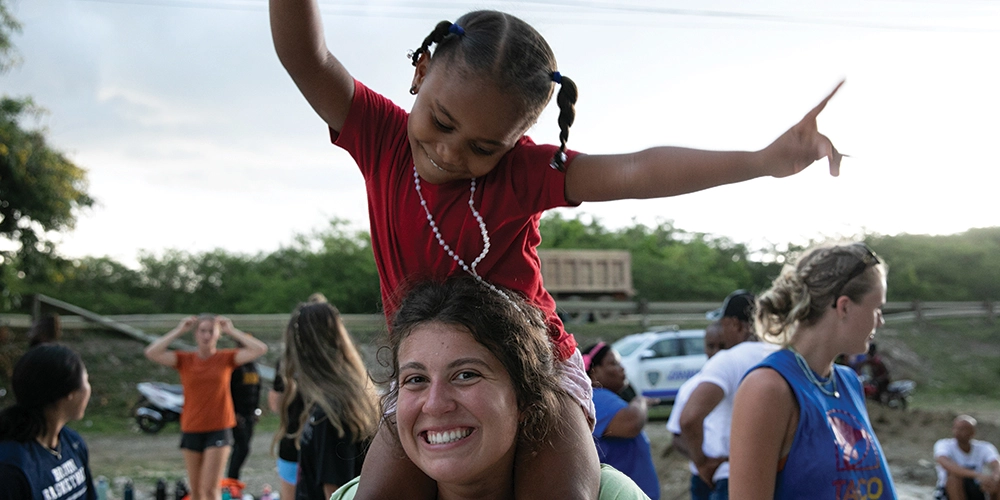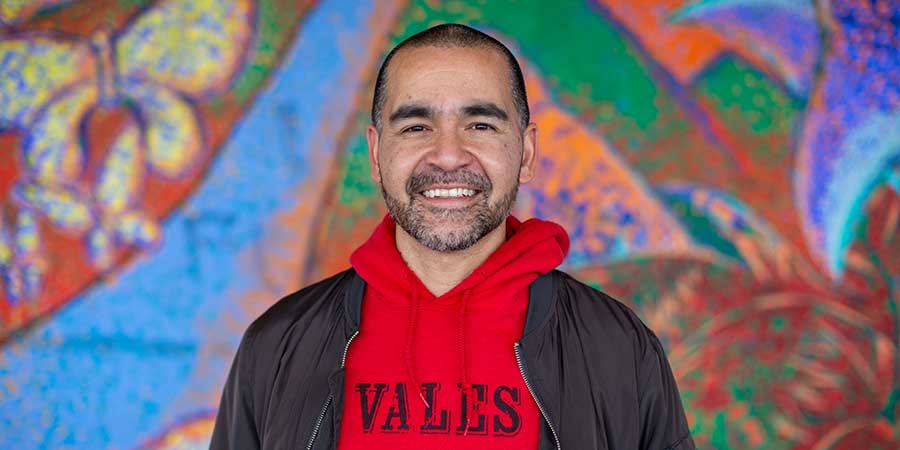
From Missions to Medicine
by Emmy King
Physician assistant Sarah Jane Lance is providing much-needed care to people living in Harney County, Oregon
Burns, Oregon, is a small rural town located on the edge of the Silvies River in the eastern part of the state. The quaint and widespread city has a lively community of about 2,750 residents who enjoy celebrating festivals and jamborees together.
In the heart of Burns, physician assistant Sarah Jane Lance is making a difference by providing primary care and orthopedic care at Harney District Hospital, the only hospital around for more than 70 miles.
“We’re all we’ve got out here,” Lance says. “Resources come and go as providers come and go. That’s why it’s so nice to have providers who live in town.”
Lance, a graduate of George Fox’s physician assistant program, became fascinated with science and medicine at a young age. She first experienced the world of medicine when she went on international mission trips with her grandmother, Phyllis, as a child.
Phyllis served on hundreds of trips as a tropical medicine nurse practitioner and helped treat infectious diseases in various countries with Lance in tow. She has since retired from serving abroad on mission trips, but before doing so she and Lance traveled to Nicaragua, Haiti, El Salvador and the Dominican Republic to provide aid to underserved communities.
“It was incredible to see my grandmother in her element and experience medicine in another country.”
Lance’s grandmother was one of her biggest inspirations growing up. She was never afraid to adventure into the unknown to help people who truly needed it.
“I remember one time when we were in Haiti, and we got a flat tire in the mountains,” Lance recalls. “We had to spend the night in some village we didn’t expect to be stopping at. I remember lying in bed, and there were spiders, tarantulas and cockroaches climbing all over the walls. I wasn’t super comfortable with that, and I looked over at my grandmother and heard her say, ‘Oh, this is nothing. I’ve slept with rats.’”
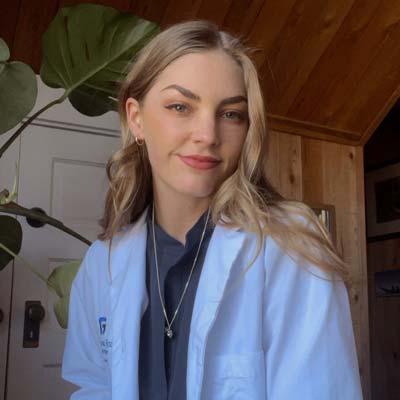
Lance’s early experiences on the mission field ultimately helped shape her perception of medicine and its importance. However, it was an experience Lance shared with her dad that really sent her down the medical track.
When Lance was young, she enjoyed climbing and hiking with her father. On one occasion they attended a climbing conference on Mount Rainier, where they met several climbers who had scaled all the notoriously dangerous mountains, including Mount Everest. Lance heard all sorts of nail-biting stories from the adventures, and the tales captivated her.
“The stories I heard about how the brain works and how it is able to overcome all of these challenges (such as altitude) were fascinating to me,” Lance says.
The experience served as a catalyst for Lance’s fascination with the human brain, and her interest only grew throughout high school. She went on to attend UC Santa Cruz as a neuroscience major, and she was able to immerse herself in the program and get ahead due to its small size.
She was even given the opportunity to participate in research projects with the rest of her cohort as an undergraduate. Together with her peers, Lance conducted research, specifically about neurodegeneration and Alzheimer’s disease. She loved the neuroscience program at UC Santa Cruz, but after graduation she still felt she was missing something. That’s when she came to a realization that would alter the course of her life.
“I missed the daily human connection side of medicine,” Lance says.
As a neuroscientist, Lance had been doing all her work up to this point in labs. She missed getting to serve people face-to-face, like she had when she went on mission trips with her grandmother years before. She still held a deep love for neuroscience, but she wanted to do more hands-on patient care. She wanted to make a difference in the lives of individuals. With this realization, she decided to step away from neuroscience and pursue a career as a physician assistant.
But Lance’s new dream came with a lot of work. Becoming a PA requires an abundance of clinical hours, which Lance didn’t have in her neuroscience background. She had to work odd jobs in the medical field to build up her hours before she could even apply to PA school.
First, she became an EMT in LA County. After that, she was a scribe for a family practice before serving as a counselor for a crisis hotline. As she accumulated more and more hours of clinical experience, Lance was able to apply to PA school. Ultimately, she applied and was accepted to George Fox’s dual masters and doctorate PA program in 2021. She graduated from the masters portion of the program in December 2022 and will earn her doctor of medical science degree later this month.
George Fox’s PA program has proven to be a great fit for Lance. The smaller class sizes and cohort structure mimics what she had in the neuroscience program at UC Santa Cruz, and she loves the way her classes are designed. Lance doesn’t have a single lecture class; instead, classes revolve around what Fox professors call “PBL,” or problem-based learning. Instead of listening to lectures, students sit in small groups and work through cases together.
“It’s difficult at times to be in the midst of PA school. Sometimes you just want to go off and study on your own. Being pushed to be in these groups and to work through things together is challenging, but it forces you to grow.”
The PBL style has helped Lance grow personally, professionally and intellectually. It also enables her to interact more with her classmates and professors, giving her the opportunity to be known and know others.
“It’s a different kind of experience,” Lance says. “You are working not only alongside your classmates but with them, which more so reflects what you’ll be doing as a practitioner: working with teams.”
Lance is also grateful for her professors. They are always present and available to answer questions or offer help, and she was able to spend a lot of time with them.
“When you enjoy your professors, it makes all the difference,” she says. “At Fox, the professors are easy to connect with. They’re very passionate and real, and they’re always available. They’re a great support.”
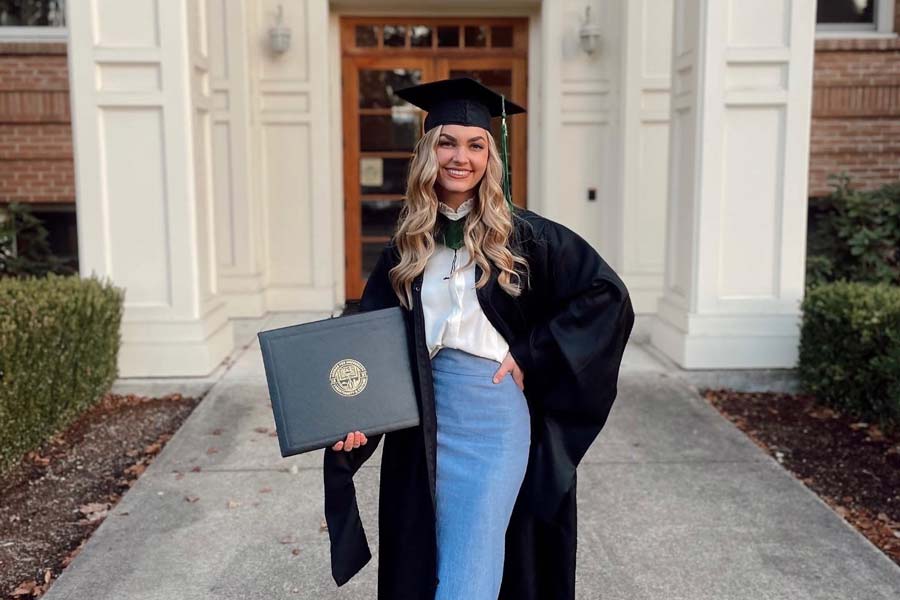
George Fox’s PA program has equipped Lance with the knowledge and skills she needs to serve communities everywhere – particularly those that are underserved. Burns is one of those places, and Lance is looking forward to being a part of the Harney medical community.
Lance and her husband are originally from Southern California, but a while back, they visited Burns together and fell in love with the quaint town and its community. Soon after, they decided to pack up their lives and move there indefinitely. That was a few years ago, and they’re happy with their decision.
Even so, Harney District Hospital is small, and it doesn’t have all the resources and facilities that larger hospitals have. This forces people who require certain treatments to make a five-hour round-trip drive to Bend, even if all they need is a post-op check-in.
“Harney prides itself on being able to provide as much care as it can for the community,” Lance says. “Whenever possible, they purchase new machines or upgrade what they have. But there are some resources that aren't realistic for small towns.”
In addition, many of Harney’s providers fly in from distant locations for a couple weeks at most, and then they’re on the next flight out. That makes local providers like Lance all the more important – and now she’s helping the hospital restore its orthopedic program.
“I’m excited to be a part of the reestablishment of orthopedic care. At the moment, I’m training to be the primary full-time orthopedic provider here.”
Lance not only understands the importance of her work, but she enjoys it. “As a PA, you’re able to work in more than one field, and you can make lateral movement,” Lance says. “There’s a lot of possibilities in that.”
Lance enjoys working with the team at Harney as they tackle problems and find solutions. “While I was on PA rotations, I was able to get to know the HDH team in emergency services, inpatient care and family practice,” Lance says. “It’s rewarding to work through a challenge with a team.”
But most of all, Lance simply likes interacting with people, coworkers and patients. “Human connection is one of the big things that brought me into medicine over other sciences,” she reflects.
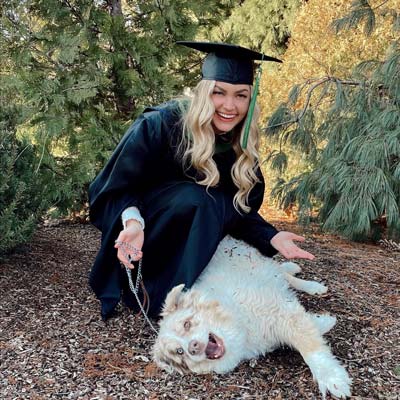
Burns may be a small, spread-out town, but working as a provider at Harney allows Lance to connect with those in her community she might not have been able to connect with otherwise. Every day, she gets to help others as she learns more about the place she lives.
Joining the team at Harney has reassured Lance that human care is her purpose. She has come to realize that she doesn’t have to be serving internationally to serve underserved populations. She’s providing care that’s not otherwise available to the people of Burns, and she’s not just there to tend to their wounds. She’s also there to talk to them and form lasting connections as she works to expand their care services.
“Being with patients and serving them in some of their most vulnerable times is the most rewarding part about being a PA.”
